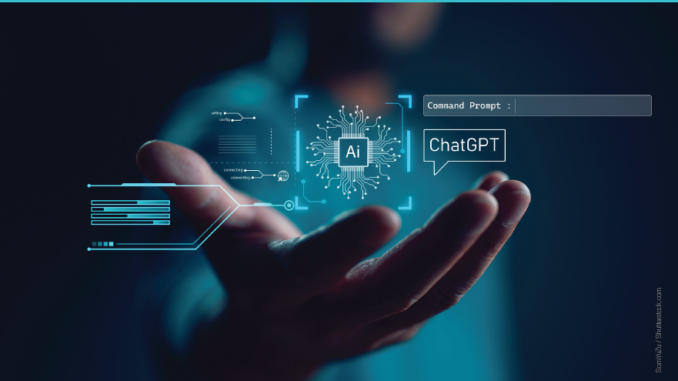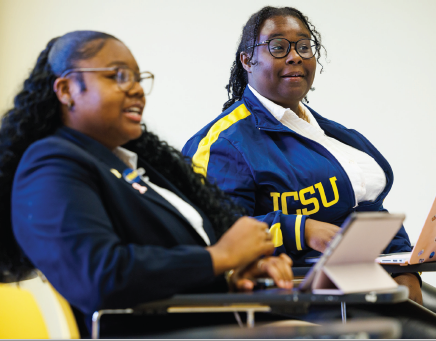
By Angela Lindsay
If you’ve ever used GPS to rattle off directions while driving or asked Alexa to find a great recipe for your next holiday party, then you have used artificial intelligence and advanced technology. AI has infiltrated every aspect of our daily lives, and its impact on college campuses is already being greatly felt.
A March 2023 BestColleges.com survey of 1,000 current undergraduate and graduate students found that 43 percent of college students overall said they have had experience using AI tools like ChatGPT, and half of those acknowledge turning to those tools to work on assignments or exams. This figure translates into 1 in 5 college students admitting they employ AI to complete their schoolwork.
“Much like the transition institutions had to make during the pandemic, these technologies are forcing changes in the way we must think about assessing student learning,” said Dr. John Bannister, director of Johnson C. Smith University’s Center for Innovative Teaching and Learning. “AI has the capacity to change approaches to much of the learning experience. We are still in the infancy of integrating AI into the college experience, so I think students are still deciding how they are going to use the tool.”
Eryn Glover, a class of 2025 marketing major at JCSU, said she has used AI to assist her with spelling corrections and writing suggestions to make sure that she is “meeting APA (American Psychological Association) formats and criteria.”
She added, “AI has greatly enhanced my school experience. “The benefits are that it does what I would do but faster.”
The primary challenge of using AI is understanding the best ways to use it. While the tool is mainly regarded as a crutch for students, Bannister said he looks forward to the time when AI will be used to aid the studying and remediation processes. That said, Bannister acknowledges that “AI is making its way through the higher education landscape” and is “forcing everyone to revisit how they do everything.”
He continued, “That reimagining will lead to even more advancements in our space. These technologies also allow students to better influence the learning process. Because they are new tools, students can help faculty develop, test and analyze learning using these tools.”
Dr. Anthony Davis, President of Livingstone College agrees. “Artificial Intelligence is an emerging technology that is here to stay. Much like the calculator in the 70s, AI should be viewed as a tool,” he said. As with any innovation, AI presents its own unique set of complexities that could lead to a host of legal and ethical complications for faculty and students alike — academic impropriety, such as plagiarism, perhaps being chief among them. The BestColleges.com survey further found that over 51 percent of students surveyed believe that using AI tools like ChatGPT to complete assignments and exams is cheating. Two in 10 disagreed, and the remainder were neutral.
“I think right now, most of the press around these tools focuses on how they can be used to cheat,” Bannister said. “I think as institutions get more of an understanding of these tools, they will learn how to effectively add them to their toolkits. Hopefully, the concern of cheating will lead to new ways to access learning.”
Greg Pillar, Ph.D., associate provost for academic affairs at Queens University of Charlotte said his institution is currently updating its honor code to establish boundaries around the use of AI.
“As always, there is an expectation that students are to submit their own original work. We will continue to follow our established policies when potential violations of our Honor Code occur, including those that involve the improper use of AI technology,” he said.
This year, Queen’s class of 2027 is the largest and most academically prepared class in the university’s history, shattering a 166-year-old record, according to Adrienne Amador Oddi, vice president for strategic enrollment and communications at Queens. This class of incoming freshmen are part of Generation Z (born between 1995 to 2009), and it is the most likely generation to integrate advanced technologies like virtual reality and augmented reality seamlessly into their everyday lives, according to a March 2020 Forbes article. As such, colleges and universities may be prompted to be more intentional about monitoring and incorporating AI and advanced technology use regarding coursework.
Given the ever-evolving educational landscape,” said Pillar, “we are continuously evaluating our policies and procedures as we cultivate a better understanding of the impact and opportunities of using AI in higher education.”
There are many different ways students can use AI without being unethical, said Glover.
For example, when you use PowerPoint and it gives you suggestions on slide layouts that are more appealing,” she said. “Or take Grammarly, for example — it helps student essays and emails sound more professional and grammatically correct. AI has also helped me better understand topics rather than waiting on a professor to reply to emails or questions.”
Students’ use of AI for courses is left to the discretion of the faculty member teaching the class, said Dr. Dale-Marie Wilson, assistant professor in the Computer Science Department at the University of North Carolina at Charlotte.
For one of her computer classes, Wilson said she recognizes “the value and potential of artificial intelligence as a tool for learning and problem-solving.” However, she said, “For any other activities submitted for a grade, if a student incorporates AI-generated or AI-assisted work, they must clearly indicate the involvement of AI and provide proper attribution to the AI tools or models used.”
She added, “Current AI tools seem disruptive to the higher education experience in that they are forcing educators to re-think how we teach and assess the concepts grasped by students. Also, as both students and faculty are using AI to generate personal statements and recommendations, they are becoming more dependent on tools rather than their critical thinking skills.”
Aside from the actual learning element associated with the college experience, AI may also be used increasingly to perform administrative functions and time-intensive tasks and to make problem-solving more efficient, according to a June 2023 Wiley University Services article.
Glover also said AI helps college students prepare for the changing workforce. “It’s important for students to adapt to and learn AI so that they are more valuable in the future,” she added. “I definitely believe that AI advances college students rather than holding them back.
“Over time, I believe these technologies will usher in new ways of teaching and learning,” Bannister said. “I am excited to see how educators will use these tools in the future.”







